英语演讲PPT的WORD演讲稿 (主题:sciene)
- 格式:doc
- 大小:27.50 KB
- 文档页数:2
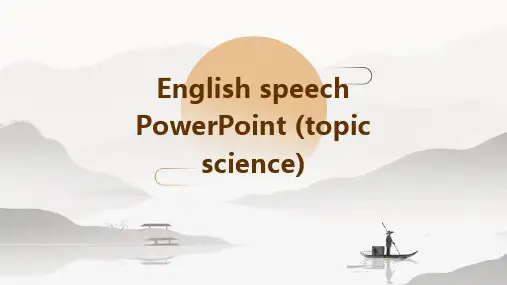
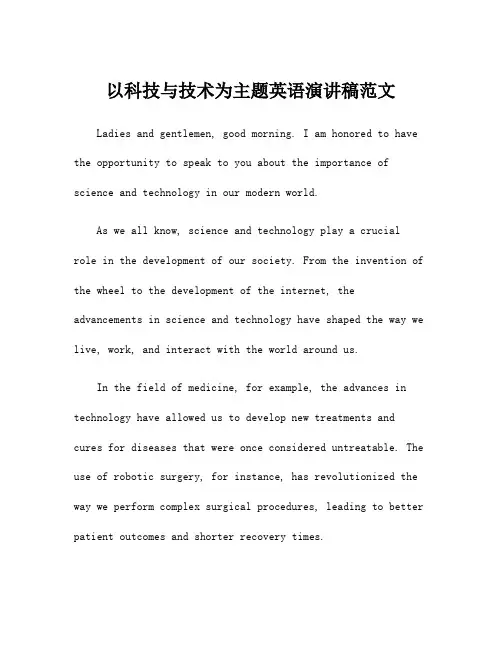
以科技与技术为主题英语演讲稿范文Ladies and gentlemen, good morning. I am honored to have the opportunity to speak to you about the importance of science and technology in our modern world.As we all know, science and technology play a crucialrole in the development of our society. From the invention of the wheel to the development of the internet, the advancements in science and technology have shaped the way we live, work, and interact with the world around us.In the field of medicine, for example, the advances in technology have allowed us to develop new treatments and cures for diseases that were once considered untreatable. The use of robotic surgery, for instance, has revolutionized the way we perform complex surgical procedures, leading to better patient outcomes and shorter recovery times.In the realm of communication, technology has enabled us to connect with people from all over the world in an instant. The development of smartphones and social media platforms has made it easier than ever to stay in touch with friends and family, no matter where they are located.In the field of transportation, science and technology have led to the development of electric cars and high-speed trains, which have the potential to reduce our dependence on fossil fuels and decrease our carbon footprint.In the workplace, technology has led to the automation of many repetitive tasks, freeing up valuable time for employees to focus on more complex and creative endeavors.Furthermore, the advancements in artificial intelligence and machine learning have the potential to revolutionize industries ranging from finance to healthcare, by allowingfor the analysis of vast amounts of data in ways that were previously unimaginable.In today's world, the pace of technological change is faster than ever before. As a result, it is crucial that we continue to invest in science and technology, in order to keep pace with these changes and ensure that we are able to harness the full potential of these advancements.It is also important that we ensure that these advancements are accessible to all members of society, regardless of their background or socio-economic status. This means investing in education and training programs to ensure that everyone has the opportunity to learn about and benefit from these advancements.In conclusion, the advancements in science and technology have the potential to change the world in ways that we cannot even imagine. It is up to us to ensure that we continue to invest in these advancements and make sure that they are accessible to all members of society. Thank you.。
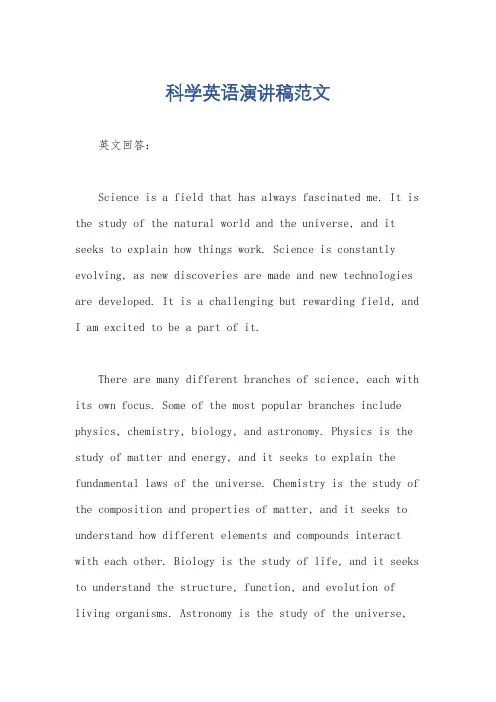
科学英语演讲稿范文英文回答:Science is a field that has always fascinated me. It is the study of the natural world and the universe, and it seeks to explain how things work. Science is constantly evolving, as new discoveries are made and new technologies are developed. It is a challenging but rewarding field, and I am excited to be a part of it.There are many different branches of science, each with its own focus. Some of the most popular branches include physics, chemistry, biology, and astronomy. Physics is the study of matter and energy, and it seeks to explain the fundamental laws of the universe. Chemistry is the study of the composition and properties of matter, and it seeks to understand how different elements and compounds interact with each other. Biology is the study of life, and it seeks to understand the structure, function, and evolution of living organisms. Astronomy is the study of the universe,and it seeks to understand the origin, evolution, and composition of the cosmos.Science is a global enterprise, and scientists from all over the world collaborate to share knowledge and discoveries. There are many different scientific organizations, such as the National Academy of Sciences,the American Association for the Advancement of Science,and the Royal Society. These organizations help to promote scientific research and education, and they provide a forum for scientists to share their ideas.Science has had a profound impact on our world. It has led to the development of new technologies, such as the computer, the telephone, and the airplane. It has also ledto the development of new medical treatments, such as antibiotics and vaccines. Science has made our lives longer, healthier, and more prosperous.Science is important because it helps us to understand the world around us. It also helps us to develop new technologies and medical treatments that can improve ourlives. If you are interested in a career in science, I encourage you to pursue your interests. Science is a challenging but rewarding field, and it can lead to alifetime of discovery and achievement.中文回答:科学是一个一直让我着迷的领域。
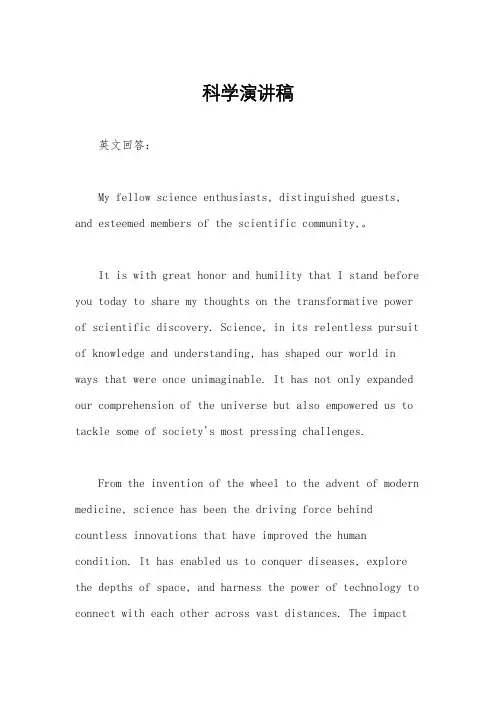
科学演讲稿英文回答:My fellow science enthusiasts, distinguished guests, and esteemed members of the scientific community,。
It is with great honor and humility that I stand before you today to share my thoughts on the transformative power of scientific discovery. Science, in its relentless pursuit of knowledge and understanding, has shaped our world in ways that were once unimaginable. It has not only expanded our comprehension of the universe but also empowered us to tackle some of society's most pressing challenges.From the invention of the wheel to the advent of modern medicine, science has been the driving force behind countless innovations that have improved the human condition. It has enabled us to conquer diseases, explore the depths of space, and harness the power of technology to connect with each other across vast distances. The impactof scientific advancements can be seen in every aspect of our lives, from the food we eat to the cars we drive and the healthcare we receive.One of the most remarkable ways science has revolutionized our world is through its insights into the human body. The discovery of DNA, for example, has led to groundbreaking advancements in medicine, such as gene therapy and targeted drug treatments. Scientists have also made significant progress in understanding the complexities of the brain, shedding light on how we think, feel, and make decisions. This knowledge has the potential to transform the way we approach mental health and neurological disorders.Another area where science has made extraordinary contributions is in the field of environmental sustainability. Climate change, pollution, and the depletion of natural resources pose serious threats to our planet. Scientists are working tirelessly to develop innovative solutions to these challenges. They are researching renewable energy sources, developing moreefficient agricultural practices, and exploring ways to reduce our carbon footprint. By combining cutting-edge technology with a deep understanding of the natural world, scientists are helping us create a more sustainable future.Of course, scientific discovery is not without its challenges. The pursuit of knowledge often involves setbacks, failures, and moments of doubt. But it is precisely these challenges that make scientific progress so valuable. Each time we encounter an obstacle, we learn something new. Each time we revise our theories, we get closer to the truth. Science teaches us to embrace uncertainty, think critically, and never stop questioning.As we look to the future, it is clear that science will continue to play a pivotal role in shaping our world. From exploring the mysteries of the quantum realm to developing new technologies that enhance our lives, the possibilities are endless. But it is important to remember thatscientific discovery is not just about making groundbreaking advancements. It is also about fostering a spirit of curiosity, creativity, and collaboration.Science is a human endeavor. It is driven by our insatiable need to understand the world around us and to make it a better place. It is through the collectiveefforts of scientists from all backgrounds, workingtogether and sharing their knowledge, that we will continue to unlock the secrets of nature and build a brighter future for generations to come.In the words of the renowned physicist Richard Feynman, "Science is the belief in the ignorance of experts." Let us embrace our ignorance and never stop exploring, questioning, and learning. Let us continue to push the boundaries of human knowledge and use our scientific discoveries tocreate a world that is healthier, more sustainable, and more just for all.Thank you.中文回答:尊敬的科学爱好者们、尊贵的嘉宾们、以及备受尊敬的科学界同仁们,。
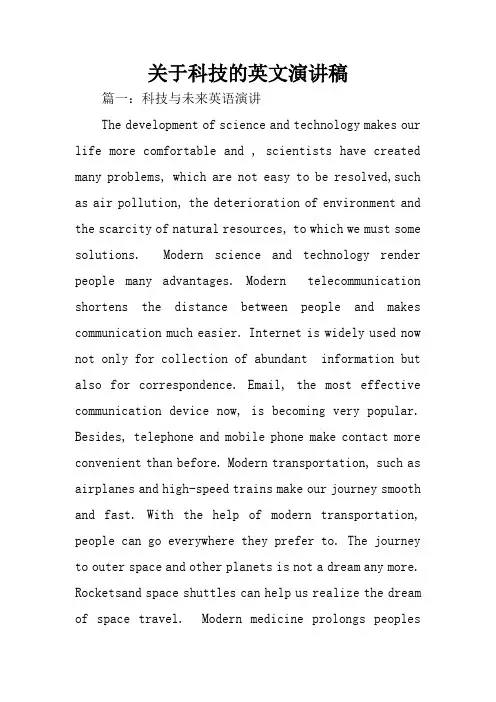
关于科技的英文演讲稿篇一:科技与未来英语演讲The development of science and technology makes our life more comfortable and , scientists have created many problems, which are not easy to be resolved,such as air pollution, the deterioration of environment and the scarcity of natural resources, to which we must some solutions. Modern science and technology render people many advantages. Modern telecommunication shortens the distance between people and makes communication much easier. Internet is widely used now not only for collection of abundant information but also for correspondence. Email, the most effective communication device now, is becoming very popular. Besides, telephone and mobile phone make contact more convenient than before. Modern transportation, such as airplanes and high-speed trains make our journey smooth and fast. With the help of modern transportation, people can go everywhere they prefer to. The journey to outer space and other planets is not a dream any more. Rocketsand space shuttles can help us realize the dream of space travel. Modern medicine prolongs peopleslife and relieves patients of sufferings from many diseases. Cancer and AIDS are fatal to peoples health. Thanks to the endeavors scientists have made, these diseases become treatable. However, the process of scientific development also arouses many sever problems to our human beings. Internet, though widely used in modern communication, is easy to be destroyed by computer virus. Outer space exploration has produced much waste in the space. A tiny metal, a screw, for example can destroy a flying man-made is making natural resources become scarce. Confronted with these problems, scientists are seeking prompt and feasible solutions. The development of science and technology bring about both positive and negative effects to us. We must eliminate the positive effects to the least extent.篇二:英语演讲稿科技关于科技的英语演讲稿—technology and future the presence of students, ladies and teachers, everyone!i was prepared intervalsof cloud today, in honor here entitled technology and future speech, i am very proudof both, but some unease. in recent years, we have seen our great motherland, thecause of the rapid development of technology, which allow me to a chinese i feel veryproud. remember that long ago, cell phone use almost the only one, which is called,but a few years ago, cell phones has undergone great changes, not only look morebeautiful, but also use more, you can use the phones to take pictures, meetings,internet, textmessages, etc. a series of things that i their life more convenient, so i am moreaware of the strength of the technology, but i am just a fledglings students,technology as the word also aware of the limited, i am unable to use some very difficulttheory to elaborate technology xuanji, no right to work on their elders i can promiseof the technology blueprint. but i am willing to use a student’s perspective to theimagine technology and the future. from geneticengineering is a live princes dream, nano-technology - not washing your clothing, promises; from artificial intelligencewill give you a cute robot dog warm, transgenicopening up to the current level of science and technology has lead a large country,our motherland experienced a number of ups and downs, how many difficulties and bumpyhowever, we still back all of the motherland, the motherland because we firmly believethat - not only technological change destiny, can change the , but we will not give up that easily, we use our youth to predecessorsvowed: never live up to their predecessors of our hope. looking back at the historyof civilization, anderson is the history of mankind against the darkness of ignorance,is the参考翻译:在场的学生们,女士们,老师,大家好!我准备间隔云今天,为了纪念在这里题为“科技与未来”的讲话,我感到非常自豪的两个,但有些不安。
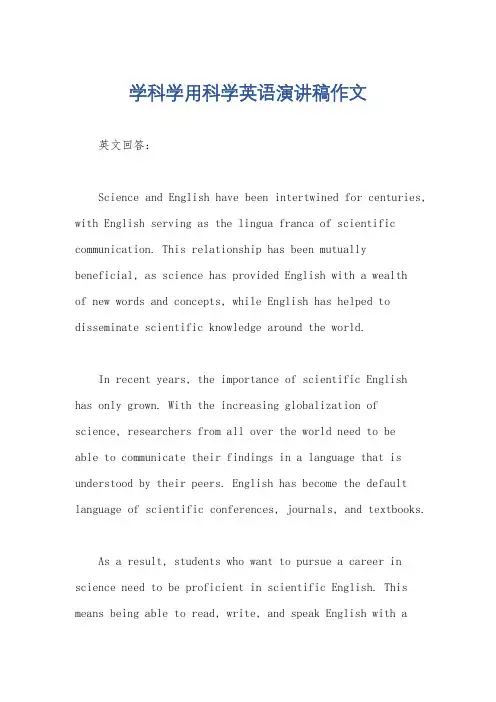
学科学用科学英语演讲稿作文英文回答:Science and English have been intertwined for centuries, with English serving as the lingua franca of scientific communication. This relationship has been mutually beneficial, as science has provided English with a wealthof new words and concepts, while English has helped to disseminate scientific knowledge around the world.In recent years, the importance of scientific English has only grown. With the increasing globalization of science, researchers from all over the world need to beable to communicate their findings in a language that is understood by their peers. English has become the default language of scientific conferences, journals, and textbooks.As a result, students who want to pursue a career in science need to be proficient in scientific English. This means being able to read, write, and speak English with ahigh level of accuracy and fluency. It also means being familiar with the specialized vocabulary and grammar of scientific English.There are a number of resources available to help students learn scientific English. These include textbooks, websites, and online courses. There are also many opportunities to practice scientific English in the classroom and in the laboratory.With the right resources and effort, students can become proficient in scientific English and open up a world of opportunities for themselves.中文回答:科学与英语之间的关系由来已久,英语作为科学交流的通用语言。
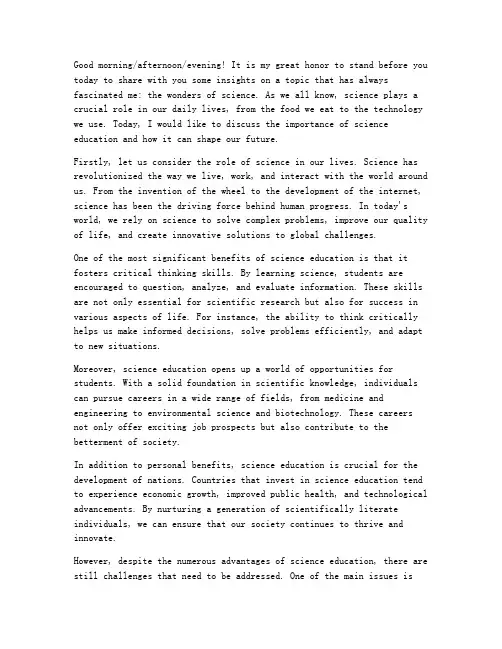
Good morning/afternoon/evening! It is my great honor to stand before you today to share with you some insights on a topic that has always fascinated me: the wonders of science. As we all know, science plays a crucial role in our daily lives, from the food we eat to the technology we use. Today, I would like to discuss the importance of science education and how it can shape our future.Firstly, let us consider the role of science in our lives. Science has revolutionized the way we live, work, and interact with the world around us. From the invention of the wheel to the development of the internet, science has been the driving force behind human progress. In today's world, we rely on science to solve complex problems, improve our quality of life, and create innovative solutions to global challenges.One of the most significant benefits of science education is that it fosters critical thinking skills. By learning science, students are encouraged to question, analyze, and evaluate information. These skills are not only essential for scientific research but also for success in various aspects of life. For instance, the ability to think critically helps us make informed decisions, solve problems efficiently, and adapt to new situations.Moreover, science education opens up a world of opportunities for students. With a solid foundation in scientific knowledge, individuals can pursue careers in a wide range of fields, from medicine and engineering to environmental science and biotechnology. These careers not only offer exciting job prospects but also contribute to the betterment of society.In addition to personal benefits, science education is crucial for the development of nations. Countries that invest in science education tend to experience economic growth, improved public health, and technological advancements. By nurturing a generation of scientifically literate individuals, we can ensure that our society continues to thrive and innovate.However, despite the numerous advantages of science education, there are still challenges that need to be addressed. One of the main issues isthe lack of access to quality science education in many parts of the world. This gap not only hinders the development of individuals but also hampers the progress of entire nations.To bridge this gap, it is essential for governments, educational institutions, and organizations to collaborate and implement effective strategies. Some of these strategies include:1. Investing in infrastructure: Providing schools with modern laboratories, equipment, and resources is crucial for delivering high-quality science education.2. Training qualified teachers: Ensuring that science teachers have the necessary knowledge and skills to inspire and educate students is essential for effective science education.3. Promoting science literacy: Encouraging students to engage inscience-related activities, such as science fairs and competitions, can help foster a passion for science and inspire them to pursue scientific careers.4. Incorporating science in everyday life: By making science relevant and accessible, we can help students understand the importance of scientific knowledge and its application in real-life situations.In conclusion, science education is a cornerstone for personal development, national progress, and global prosperity. By investing in science education, we can empower individuals, create a skilled workforce, and address the challenges of the future. Let us work together to ensure that every student has the opportunity to explore the wonders of science and contribute to the betterment of our world.Thank you for your attention, and I would be more than happy to answer any questions you may have.Good day/afternoon/evening!。
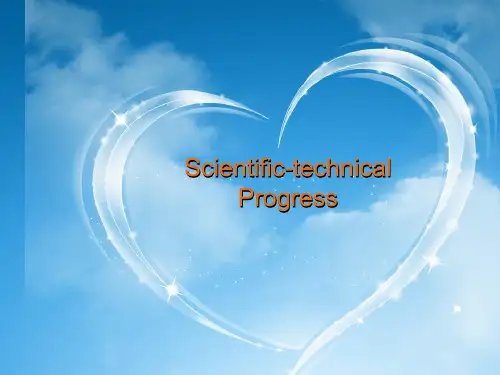
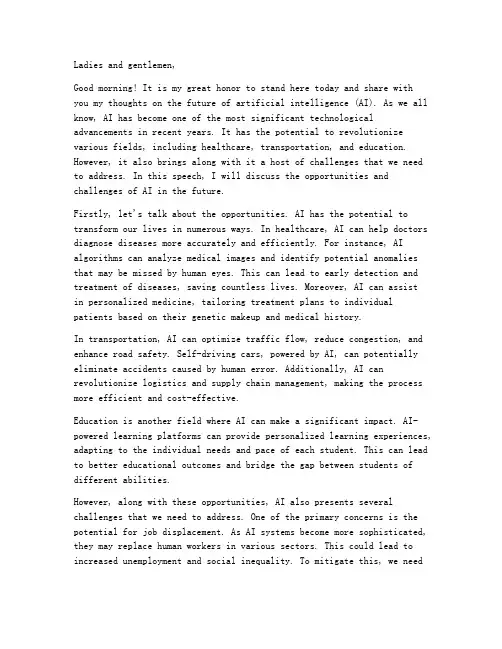
Ladies and gentlemen,Good morning! It is my great honor to stand here today and share withyou my thoughts on the future of artificial intelligence (AI). As we all know, AI has become one of the most significant technological advancements in recent years. It has the potential to revolutionize various fields, including healthcare, transportation, and education. However, it also brings along with it a host of challenges that we need to address. In this speech, I will discuss the opportunities and challenges of AI in the future.Firstly, let's talk about the opportunities. AI has the potential to transform our lives in numerous ways. In healthcare, AI can help doctors diagnose diseases more accurately and efficiently. For instance, AI algorithms can analyze medical images and identify potential anomalies that may be missed by human eyes. This can lead to early detection and treatment of diseases, saving countless lives. Moreover, AI can assistin personalized medicine, tailoring treatment plans to individualpatients based on their genetic makeup and medical history.In transportation, AI can optimize traffic flow, reduce congestion, and enhance road safety. Self-driving cars, powered by AI, can potentially eliminate accidents caused by human error. Additionally, AI can revolutionize logistics and supply chain management, making the process more efficient and cost-effective.Education is another field where AI can make a significant impact. AI-powered learning platforms can provide personalized learning experiences, adapting to the individual needs and pace of each student. This can lead to better educational outcomes and bridge the gap between students of different abilities.However, along with these opportunities, AI also presents several challenges that we need to address. One of the primary concerns is the potential for job displacement. As AI systems become more sophisticated, they may replace human workers in various sectors. This could lead to increased unemployment and social inequality. To mitigate this, we needto invest in retraining and upskilling programs to help workers transition into new roles.Another challenge is the ethical implications of AI. As AI systems become more powerful, there is a risk of them being used for malicious purposes, such as cyber attacks, surveillance, and even autonomous weapons. We need to establish robust ethical guidelines and regulations to ensure that AI is used responsibly.Furthermore, there is the issue of bias and fairness. AI systems are only as good as the data they are trained on. If the data is biased, the AI system will also be biased. This can lead to unfair outcomes, such as discrimination against certain groups. We need to work on developing diverse and inclusive datasets to ensure that AI is fair and unbiased.In conclusion, the future of AI is full of opportunities and challenges. We must seize the opportunities while addressing the challenges to ensure that AI benefits all of humanity. By investing in education, developing ethical guidelines, and fostering collaboration between governments, industry, and academia, we can navigate the future of AI and make it a force for good.Thank you for your attention.。
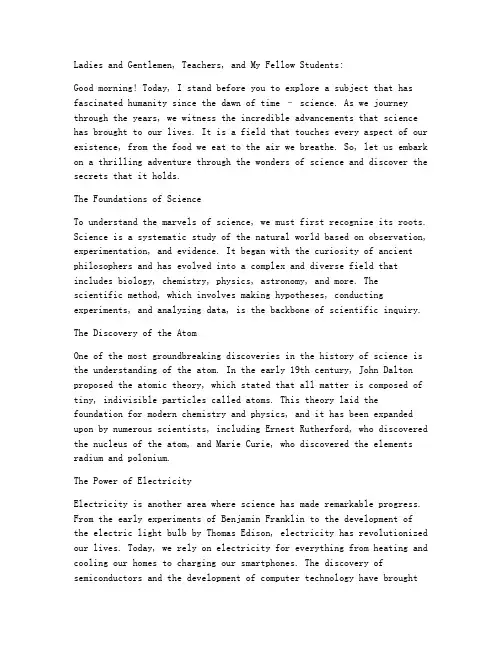
Ladies and Gentlemen, Teachers, and My Fellow Students:Good morning! Today, I stand before you to explore a subject that has fascinated humanity since the dawn of time – science. As we journey through the years, we witness the incredible advancements that science has brought to our lives. It is a field that touches every aspect of our existence, from the food we eat to the air we breathe. So, let us embark on a thrilling adventure through the wonders of science and discover the secrets that it holds.The Foundations of ScienceTo understand the marvels of science, we must first recognize its roots. Science is a systematic study of the natural world based on observation, experimentation, and evidence. It began with the curiosity of ancient philosophers and has evolved into a complex and diverse field that includes biology, chemistry, physics, astronomy, and more. Thescientific method, which involves making hypotheses, conducting experiments, and analyzing data, is the backbone of scientific inquiry.The Discovery of the AtomOne of the most groundbreaking discoveries in the history of science is the understanding of the atom. In the early 19th century, John Dalton proposed the atomic theory, which stated that all matter is composed of tiny, indivisible particles called atoms. This theory laid the foundation for modern chemistry and physics, and it has been expanded upon by numerous scientists, including Ernest Rutherford, who discovered the nucleus of the atom, and Marie Curie, who discovered the elements radium and polonium.The Power of ElectricityElectricity is another area where science has made remarkable progress. From the early experiments of Benjamin Franklin to the development of the electric light bulb by Thomas Edison, electricity has revolutionized our lives. Today, we rely on electricity for everything from heating and cooling our homes to charging our smartphones. The discovery of semiconductors and the development of computer technology have broughtus into the digital age, making information accessible to anyone with an internet connection.The Wonders of the Human BodyThe study of the human body has also been a significant area ofscientific exploration. Through the work of scientists like Gregor Mendel, who discovered the laws of inheritance, and Nobel laureate James Watson and Francis Crick, who deciphered the structure of DNA, we have gained a deeper understanding of life itself. Advances in medical science have led to the development of vaccines, antibiotics, and treatments for diseases that were once fatal. The field of genetics is now opening up new possibilities for personalized medicine and the treatment of genetic disorders.The Mysteries of SpaceOur curiosity about the universe has led us to explore the mysteries of space. The development of telescopes and space probes has allowed us to study distant planets, stars, and galaxies. The discovery of exoplanets has sparked excitement about the possibility of finding life beyond Earth. The Hubble Space Telescope has provided us with stunning images of the cosmos, revealing the beauty and complexity of the universe.The Environmental ChallengesWhile science has brought us many benefits, it has also highlighted the environmental challenges we face. Climate change, pollution, and the loss of biodiversity are some of the pressing issues that require our immediate attention. Scientists are working tirelessly to find solutions to these problems, from developing renewable energy sources to preserving endangered species. It is up to us, as responsible citizens, to support these efforts and take action to protect our planet.The Future of ScienceThe future of science is bright, filled with endless possibilities. As technology continues to advance, we will undoubtedly see new discoveries and innovations that will change our world. Artificial intelligence,nanotechnology, and quantum computing are just a few areas that hold immense potential. The key to harnessing this potential lies infostering a culture of curiosity, innovation, and collaboration.ConclusionIn conclusion, science is a powerful tool that has transformed our world and continues to shape our future. It is a journey of discovery, onethat requires patience, perseverance, and a willingness to question everything. As we stand on the shoulders of giants, let us continue to explore the wonders of science and uncover the secrets of our world. Together, we can make a difference and ensure a brighter, more sustainable future for generations to come.Thank you for your attention, and I invite you to join me in celebrating the marvels of science.The End。
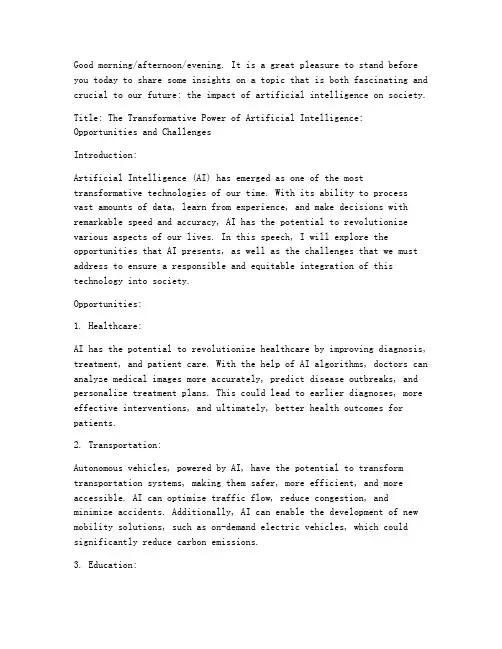
Good morning/afternoon/evening. It is a great pleasure to stand before you today to share some insights on a topic that is both fascinating and crucial to our future: the impact of artificial intelligence on society.Title: The Transformative Power of Artificial Intelligence: Opportunities and ChallengesIntroduction:Artificial Intelligence (AI) has emerged as one of the most transformative technologies of our time. With its ability to process vast amounts of data, learn from experience, and make decisions with remarkable speed and accuracy, AI has the potential to revolutionize various aspects of our lives. In this speech, I will explore the opportunities that AI presents, as well as the challenges that we must address to ensure a responsible and equitable integration of this technology into society.Opportunities:1. Healthcare:AI has the potential to revolutionize healthcare by improving diagnosis, treatment, and patient care. With the help of AI algorithms, doctors can analyze medical images more accurately, predict disease outbreaks, and personalize treatment plans. This could lead to earlier diagnoses, more effective interventions, and ultimately, better health outcomes for patients.2. Transportation:Autonomous vehicles, powered by AI, have the potential to transform transportation systems, making them safer, more efficient, and more accessible. AI can optimize traffic flow, reduce congestion, and minimize accidents. Additionally, AI can enable the development of new mobility solutions, such as on-demand electric vehicles, which could significantly reduce carbon emissions.3. Education:AI has the potential to personalize education, making it more tailored to individual student needs. By analyzing data on student performance and learning styles, AI can provide customized learning experiences, thereby enhancing the effectiveness of education and improving student outcomes.Challenges:1. Ethical Concerns:The development and deployment of AI raise ethical questions regarding privacy, bias, and accountability. We must ensure that AI systems are transparent, fair, and do not perpetuate or amplify existing biases. Additionally, we need to establish guidelines and regulations to protect individuals' privacy and prevent misuse of AI technology.2. Job Displacement:AI has the potential to disrupt traditional job markets, leading to concerns about job displacement and the future of employment. It is crucial for governments, businesses, and educational institutions to collaborate in creating new job opportunities and providing retraining programs to help workers adapt to the changing job landscape.3. Security and Safety:AI systems can be vulnerable to attacks and manipulation, which poses significant risks to national security and individual safety. We must invest in robust cybersecurity measures and ensure that AI systems are designed with safety in mind to mitigate these risks.Conclusion:In conclusion, the transformative power of artificial intelligence is undeniable. It presents us with unprecedented opportunities to improve healthcare, transportation, and education, among other sectors. However, to harness the full potential of AI and address the challenges it poses, we must work together to ensure that this technology is developed and implemented responsibly, ethically, and equitably. As we navigate thisnew era, it is essential that we remain vigilant, informed, and proactive in shaping the future of AI for the benefit of all.Thank you for your attention. I am now open to any questions you may have.[End of speech]。
关于科技的演讲稿英文Technology has become an integral part of our daily lives, shaping the way we live, work, and communicate. It has revolutionized the way we do things, making tasks easier, faster, and more efficient. Today, I want to talk about the impact of technology on our lives and the future of technological advancements.First and foremost, technology has greatly improved our communication. With the advent of smartphones, social media, and instant messaging apps, we can now connect with people from all over the world in an instant. This has not only made communication more convenient, but it has also brought people closer together, bridging the gap between different cultures and languages.Furthermore, technology has transformed the way we work. The introduction of computers, the internet, and various software programs has streamlined processes, increased productivity, and opened up new opportunities for remote work. This has allowed for greater flexibility and efficiency in the workplace, ultimately leading to a more dynamic and agile workforce.In addition, technology has had a significant impact on education. With the rise of e-learning platforms, online courses, and digital resources, students now have access to a wealth of information at their fingertips. This has revolutionized the traditional classroom setting, allowing for personalized learning experiences and the ability to study at one's own pace.Moreover, technology has played a crucial role in advancing healthcare. From state-of-the-art medical equipment to telemedicine services, technological innovations have improved patient care, diagnosis, and treatment. This has led to better health outcomes, increased accessibility to healthcare services, and the development of groundbreaking medical treatments.Looking ahead, the future of technology holds even more promise. With the rapid development of artificial intelligence, virtual reality, and quantum computing, we are onthe brink of a new era of technological innovation. These advancements have the potential to revolutionize industries, solve complex problems, and improve the quality of life for people around the world.However, it is important to acknowledge the potential challenges that come with technological advancements. Issues such as data privacy, cybersecurity, and the ethical implications of AI must be carefully considered and addressed as we continue to embrace new technologies.In conclusion, technology has undoubtedly had a profound impact on our lives, and it will continue to shape the way we live in the future. As we embrace the opportunities that come with technological advancements, it is important to also be mindful of the potential challenges and strive to use technology for the greater good of humanity.In the words of renowned scientist Albert Einstein, "It has become appallingly obvious that our technology has exceeded our humanity." Let us strive to ensure that as we continue to advance technologically, we do so with the utmost consideration for the well-being of humanity and the world we live in. Thank you.。
Ladies and gentlemen,Good morning/afternoon/evening. It is my great honor to stand before you today and share with you my thoughts on the future of science and technology. As we all know, science and technology have been the driving forces behind human progress throughout history. Today, we are living in an era of rapid technological advancements, where new discoveries and innovations are emerging at an unprecedented rate. In this speech, Iwill discuss some of the most exciting developments in science and technology and explore the potential impact they will have on our lives.I. The Age of Artificial IntelligenceArtificial intelligence (AI) has become one of the most significant scientific breakthroughs of our time. From self-driving cars to virtual assistants, AI is transforming various aspects of our lives. The potential of AI is vast, and it is expected to revolutionize industries, create new job opportunities, and even solve some of the world's most pressing problems.1. Healthcare: AI has the potential to revolutionize the healthcare industry by improving diagnostics, personalized medicine, and drug discovery. By analyzing vast amounts of data, AI can identify patterns and predict diseases at an early stage, leading to better patient outcomes.2. Transportation: Self-driving cars are expected to reduce traffic accidents, improve fuel efficiency, and provide more convenient transportation options. Additionally, AI can optimize public transportation systems, making them more efficient and accessible.3. Environmental protection: AI can play a crucial role in environmental protection by monitoring pollution levels, predicting natural disasters, and developing sustainable energy solutions.II. The Rise of Quantum ComputingQuantum computing is another groundbreaking scientific advancement that has the potential to transform various industries. Unlike classicalcomputers, quantum computers use quantum bits (qubits) to process information, enabling them to solve complex problems at an unprecedented speed.1. Cryptography: Quantum computing has the potential to breaktraditional encryption methods, which could have severe implications for cybersecurity. However, it also offers a new level of security by creating quantum encryption algorithms that are nearly impossible to crack.2. Materials science: Quantum computing can accelerate the discovery of new materials, leading to advancements in energy storage, electronics, and pharmaceuticals.3. Optimization problems: Quantum computing can solve complex optimization problems, such as logistics and supply chain management, leading to more efficient operations and cost savings.III. The Promise of BiotechnologyBiotechnology has the potential to revolutionize medicine, agriculture, and environmental protection. Advances in genetic engineering, synthetic biology, and bioinformatics are paving the way for groundbreaking innovations.1. Medicine: CRISPR technology allows scientists to edit the human genome, potentially curing genetic diseases and improving the quality of life. Additionally, personalized medicine can tailor treatments to individual patients, leading to better outcomes.2. Agriculture: Genetically modified organisms (GMOs) can increase crop yields, reduce the need for pesticides, and provide solutions to food security challenges. Synthetic biology can also develop new biofuels and bioplastics, reducing our reliance on fossil fuels.3. Environmental protection: Biotechnology can be used to clean up pollution, develop sustainable materials, and create new ways to harness renewable energy.IV. The Challenges and Ethical ConsiderationsWhile the potential of science and technology is immense, we must also address the challenges and ethical considerations associated with these advancements.1. Job displacement: Automation and AI may lead to job displacement in certain sectors, requiring us to adapt our workforce and develop new skills.2. Privacy concerns: The increasing use of data and AI raises privacy concerns, as personal information becomes more accessible to both legitimate and malicious entities.3. Ethical dilemmas: Advances in biotechnology, such as genetic editing, raise ethical questions about the boundaries of human intervention in nature.V. The Role of Governments, Industries, and IndividualsTo fully harness the potential of science and technology, it is crucial for governments, industries, and individuals to collaborate and address these challenges.1. Governments should invest in research and development, createpolicies that promote innovation, and ensure that the benefits of technology are distributed equitably.2. Industries should prioritize ethical considerations, invest in education and training, and work towards sustainable practices.3. Individuals should stay informed about technological advancements, embrace lifelong learning, and engage in discussions about the ethical implications of these innovations.In conclusion, the future of science and technology is filled with both opportunities and challenges. By embracing innovation, addressingethical considerations, and working together, we can harness the power of science and technology to create a better future for all.Thank you for your attention.。
小学英语科学演讲稿范文Science is a fascinating field that allows us to explore the wonders of the natural world around us. From the smallest particles that make up the universe to the grandest celestial bodies, science provides us with a deeper understanding of the world we live in. In this presentation, we will delve into the exciting realm of science and discover the incredible discoveries and advancements that have shaped our understanding of the world.Let us begin by considering the building blocks of our universe the atoms and molecules that make up everything we see and touch. These tiny particles, invisible to the naked eye, are the fundamental units of all matter. Through the study of chemistry, we have learned how these atoms and molecules interact with one another, forming the diverse array of substances that make up our world.One of the most remarkable aspects of chemistry is its ability to explain the properties of different materials. For example, the water we drink is made up of two hydrogen atoms and one oxygen atom bonded together. This simple arrangement gives water its uniqueproperties, such as its ability to dissolve a wide range of substances and its capacity to change states from solid to liquid to gas. By understanding the underlying chemical structure of water, we can better appreciate the vital role it plays in sustaining life on our planet.Moving beyond the microscopic world of atoms and molecules, we can explore the vast expanse of the universe. Astronomy, the studyof celestial bodies and the cosmos, has revealed an incredibly complex and awe-inspiring reality. Through the use of powerful telescopes and advanced technology, scientists have been able to observe distant galaxies, study the formation and evolution of stars, and unravel the mysteries of black holes and dark matter.One of the most exciting recent developments in astronomy is the discovery of exoplanets planets orbiting stars other than our own sun. These distant worlds have opened up new frontiers in the search for extraterrestrial life, as scientists investigate the potential for habitable conditions on these alien planets. The search for life beyond Earth is a captivating and humbling endeavor, reminding us of the vastness of the universe and the possibility of other intelligent beings.In addition to the exploration of the cosmos, science has also made remarkable advancements in the field of biology. The study of living organisms, from the smallest microbes to the largest mammals, hasyielded a wealth of knowledge about the processes that sustain life. From the intricate workings of the human body to the complex ecosystems that support diverse forms of life, biology has helped us understand our place within the natural world.One particularly fascinating area of biology is the study of genetics. The discovery of DNA, the molecule that carries the genetic information of all living things, has revolutionized our understanding of heredity and evolution. Through the study of genetics, scientists have been able to unravel the genetic codes of various organisms, leading to advancements in fields such as medicine, agriculture, and forensics.For example, the ability to sequence the human genome has paved the way for personalized medicine, where treatments can be tailored to an individual's genetic makeup. This has the potential to revolutionize the way we approach healthcare, allowing for more effective and targeted interventions. Similarly, the application of genetic research in agriculture has led to the development of genetically modified crops, which can be more resilient to pests, diseases, and harsh environmental conditions.Beyond the realms of chemistry, astronomy, and biology, science has also made significant strides in the field of physics. The study of the physical world, from the behavior of light and energy to thefundamental forces that govern the universe, has led to groundbreaking discoveries and technological advancements.One of the most famous and influential theories in physics is Albert Einstein's theory of relativity. This revolutionary concept challenged our understanding of space, time, and the nature of the universe, and has had far-reaching implications in fields such as astrophysics and modern technology. The development of quantum mechanics, another cornerstone of modern physics, has also opened up new avenues for understanding the behavior of matter and energy at the subatomic level.The applications of physics in our everyday lives are numerous and profound. From the use of electricity and the development of modern electronics to the advancements in transportation and communication technologies, the principles of physics have been instrumental in shaping the world we live in. The continued exploration and understanding of the physical world will undoubtedly lead to even more remarkable breakthroughs in the years to come.As we have seen, science is a vast and multifaceted field that encompasses a wide range of disciplines, each with its own unique insights and discoveries. From the microscopic world of atoms and molecules to the vast expanse of the universe, science has providedus with a deeper understanding of the natural world and the fundamental forces that govern it.However, the true power of science lies not only in its ability to uncover new knowledge but also in its capacity to inspire wonder and curiosity. By engaging with the scientific process, we can cultivate a sense of awe and appreciation for the incredible complexity and beauty of the world around us. Through hands-on experimentation, critical thinking, and collaborative exploration, we can foster a love of learning and a desire to continually expand the boundaries of human knowledge.As we move forward into the future, it is essential that we continue to prioritize science education and encourage the next generation of scientists, innovators, and problem-solvers. By nurturing a deep understanding and appreciation for the scientific method, we can empower young minds to tackle the challenges of the 21st century and beyond. Whether it is finding solutions to pressing environmental issues, developing new medical treatments, or unlocking the secrets of the universe, the future of our world depends on our continued commitment to the pursuit of scientific knowledge.In conclusion, the field of science is a testament to the incredible power of human curiosity and ingenuity. Through the relentlesspursuit of understanding, we have uncovered the mysteries of the natural world and transformed the way we live. As we continue to explore the frontiers of science, let us embrace the wonder and excitement of discovery, and strive to use our knowledge to create a better, more sustainable future for all.。
科学演讲稿英文回答:Good morning, distinguished faculty, esteemed guests, and fellow science enthusiasts. It is with immensegratitude and excitement that I stand before you today to share my thoughts on the profound impact of science on our world.Science, in its essence, is a journey of discovery, a relentless pursuit of knowledge and understanding. It is a universal language that transcends borders and unites us in the pursuit of truth. Throughout history, science has been the driving force behind countless innovations that have shaped our lives and propelled us forward as a species.From the invention of the wheel to the discovery of electricity, the development of antibiotics to the exploration of space, science has played a pivotal role in shaping our civilizations. It has empowered us to conquerdiseases, harness energy, and unravel the mysteries of the natural world.One of the most transformative aspects of science isits ability to improve human health. Through medical advancements, we have eradicated deadly diseases, extended our lifespans, and improved the overall quality of life for countless people. The development of vaccines, such as the polio vaccine, has saved millions of lives and prevented countless cases of debilitating suffering.Science has also been instrumental in addressing global challenges such as climate change and food security. By studying the Earth's climate system, scientists have developed models that predict future scenarios and inform policy decisions aimed at mitigating the effects of climate change. Similarly, advancements in agricultural science have led to increased crop yields, enabling us to feed a growing global population.Furthermore, science fosters critical thinking and problem-solving skills. By engaging in the scientificprocess, we learn to analyze data, draw conclusions, and communicate our findings effectively. These skills are invaluable in all aspects of life, empowering us to make informed decisions and tackle complex challenges.However, it is important to acknowledge that thepursuit of science also comes with ethical responsibilities. As scientists, we have a duty to use our knowledge and expertise for the benefit of society and to ensure that our discoveries are used for good.In conclusion, science is an indispensable force that has transformed our world and continues to shape our future. Its impact extends far beyond the laboratory; it touches every aspect of our lives, from the healthcare we receiveto the energy we use to the challenges we face as a global community. By embracing the spirit of science, we embrace the power to understand, innovate, and create a betterfuture for ourselves and generations to come.中文回答:尊敬的老师、嘉宾、以及各位科学爱好者们,早上好。
科学演讲稿英文回答:Science, a field that has captivated my mind since I was a young child, has transformed the world we live in today. It has provided us with unparalleled advancements in medicine, technology, and our understanding of the natural world. The influence of science on our lives is undeniable, and it is essential that we continue to invest inscientific research and education.In the realm of medicine, science has revolutionized the way we treat and prevent diseases. The development of vaccines has eradicated or controlled deadly illnesses such as smallpox, polio, and measles. Antibiotics have dramatically reduced the impact of bacterial infections, and advancements in surgery and medical imaging have improved the outcomes of countless patients.Science has also played a pivotal role in technologicaladvancements. From the invention of the wheel to the development of the internet, science has enabled us to solve problems, improve our productivity, and connect with each other in ways that were once unimaginable. The rapid pace of technological innovation shows no signs of slowing down, and it is likely that science will continue to drive transformative changes in the years to come.Moreover, science has deepened our understanding of the natural world. Through scientific exploration and experimentation, we have gained insights into the origins of the universe, the evolution of life on Earth, and the intricate workings of the human body. This knowledge has not only satisfied our curiosity but has also empowered us to make informed decisions about how we interact with our environment and manage our resources.Despite the undeniable benefits of science, there are also challenges that we must address. One concern is the potential for science to be used for harmful purposes, such as the development of weapons of mass destruction. Another challenge is the spread of scientific misinformation, whichcan erode public trust in science and hinder progress.To ensure that science continues to benefit humanity,it is crucial that we promote scientific literacy andcritical thinking. We need to educate our children aboutthe importance of science and provide them with the tools they need to evaluate scientific information. By fosteringa culture of science appreciation and understanding, we can empower future generations to make informed decisions and solve the challenges of tomorrow.中文回答:科学,这个从我孩提时代就俘获我心灵的领域,已经改变了我们今天生活的这个世界。
With the social development,countries are increasingly concerned about the science. Human has been being benefit from various science technology fruition and being enjoying them. Thanks to science and technology, we now live comfortably and conveniently in houses furnished with air conditioners, washing machines and televisions etc. Thanks to science and technology, we can eat fresh vegetables at the year round. Thanks to science and technology, we can travel tong distances in the fraction of a second on planes, trains and cars. Thanks to science and technology, we can even closer communication exchange. If the 20th century’s greatest scientific and technological achievements of the Internet,then the 19th century’s greatest scientific and technological achievements on the course ought to telephone.
随着社会的发展,各国日益关注的科学问题。
人类已经被从各种科学技术成果和正在享受这些好处。
科学和技术的努力,我们现在生活得舒适,方便与空调装修房子,洗衣机和电视机等由于科学和技术,我们可以吃新鲜蔬菜全年交通运输技术。
科学和技术的支持下,我们可以旅行堂在一秒钟的距离上飞机,火车和汽车。
科学和技术的支持下,我们甚至可以更紧密的沟通交流。
如果说20世纪最伟大的科学和科技成果的互联网,那么19世纪最伟大的科学和技术在球场上的成就应该电话。
Especially, after the mobile telephone appears, communication becomes easier , If people go out for business far away from their homes, the telephone can shorten the distance between them and their families. Thus they will get comfort whenever they are homesick or they get into trouble. With the help of the telephone, people can keep in touch with anyone at any time for urgent help. All in all, the telephone is so helpful that we can say that nowadays we can not live without the telephone in our daily life. Science can also further improve the phone’s performance,so for people to create better conditions for the exchange.
毫无疑问,电话使事情在很多方面容易。
特别是在移动电话出现后,沟通变得更容易,如果去经商的人远离家园,电话可以缩短他们与家人的距离。
因此,他们会得到安慰他们想家时,或他们遇到麻烦。
随着电话的帮助下,人们能继续保持联系与在任何时间,任何人紧急帮助。
总之,电话是如此有用,我们可以说,现在我们不能生活在没有我们的日常生活中的电话。
科学还可以进一步提高手机的性能,因此人们创造更好的条件交换。
However, science is a two-edged sword. While research is exerting it positive function, its negative influence might be harmful to human or encumber our development. First, because of the many breakthroughs in
the field of medicine, people are now living much longer than they used to. As a result, the population of the world is increasing, causing tots of problems. Second, because of the development of industry, tots of the wastes from factories pour into the air and rivers, causing pollution of att kinds. Third, some terrorists are using science and technology against mankind. They use biological, chemical and unclear weapons to threaten world peace.
然而,科学是一把双刃剑。
而研究是发挥它的积极作用,其负面影响可能对人体有害或抵押我们的发展。
第一,因为在医学领域的许多突破,人民现在的生活比以前更长的时间来。
因此,世界人口不断增加,造成的问题小孩子。
其次,由于工业的发展,小孩们从工厂的废弃物倒入空气和河流,造成污染的交通运输技术种。
第三,一些恐怖分子使用的是对人类科学和技术。
他们利用生物,化学武器和不明确的威胁世界和平。
Nowadays,there is a heated debate over whether cloning technique should be used in human reproduction must be considered as a serious issue. Clone,to a certain degree,is beneficial to mankind. However,the abuse of this science technology will bring human being unthinkable destruction. Recently,scientists in some countries have already started their great plan to clone human. I'm afraid that terrorists may get hold of it and reproduce lots of nuclear weapons. Besides these terrible aspects,the cloning of whole-being may destroy the diversity of people of the glob. Cloning also can give a commerical opportunity for businessmen. People will use it to earn illegal money. Moreover,clone will arouse many moral questions,which will violate human rights. So we should be cautious to use science.
如今,在是否有一个克隆技术复制人应使用必须被视为一个严重的问题,认为激烈的辩论。
克隆,在一定程度上有利于人类。
然而,这种科学技术的滥用将使人类无法想象的破坏。
最近,在一些国家的科学家已经开始了他们的伟大计划克隆人类。
我很担心,恐怖分子可能掌握它,并复制了大量核武器。
除了这些可怕的部分,全被克隆可能会破坏人的多样性的水珠。
克隆也可给商人的商业机会。
人们会使用它来非法赚取金钱。
此外,克隆会引起许多道德问题,这将侵犯人权。
因此,我们应该谨慎使用科学。